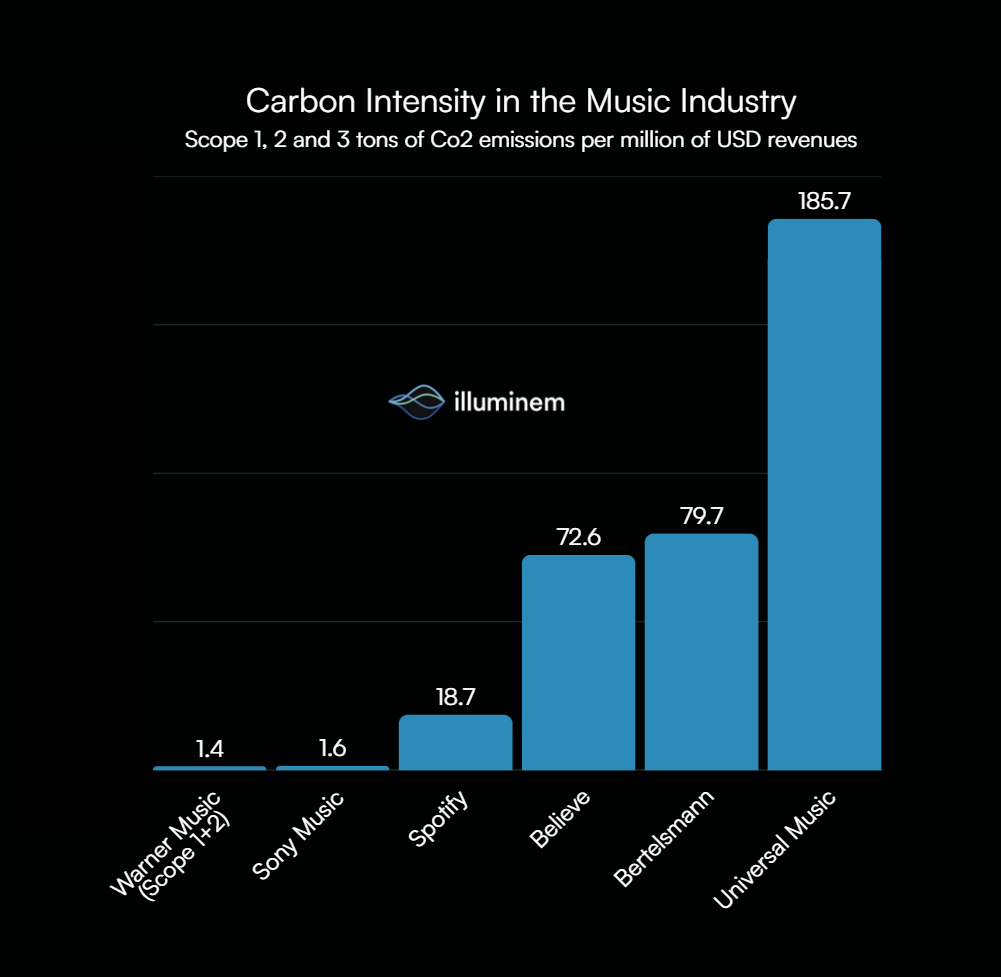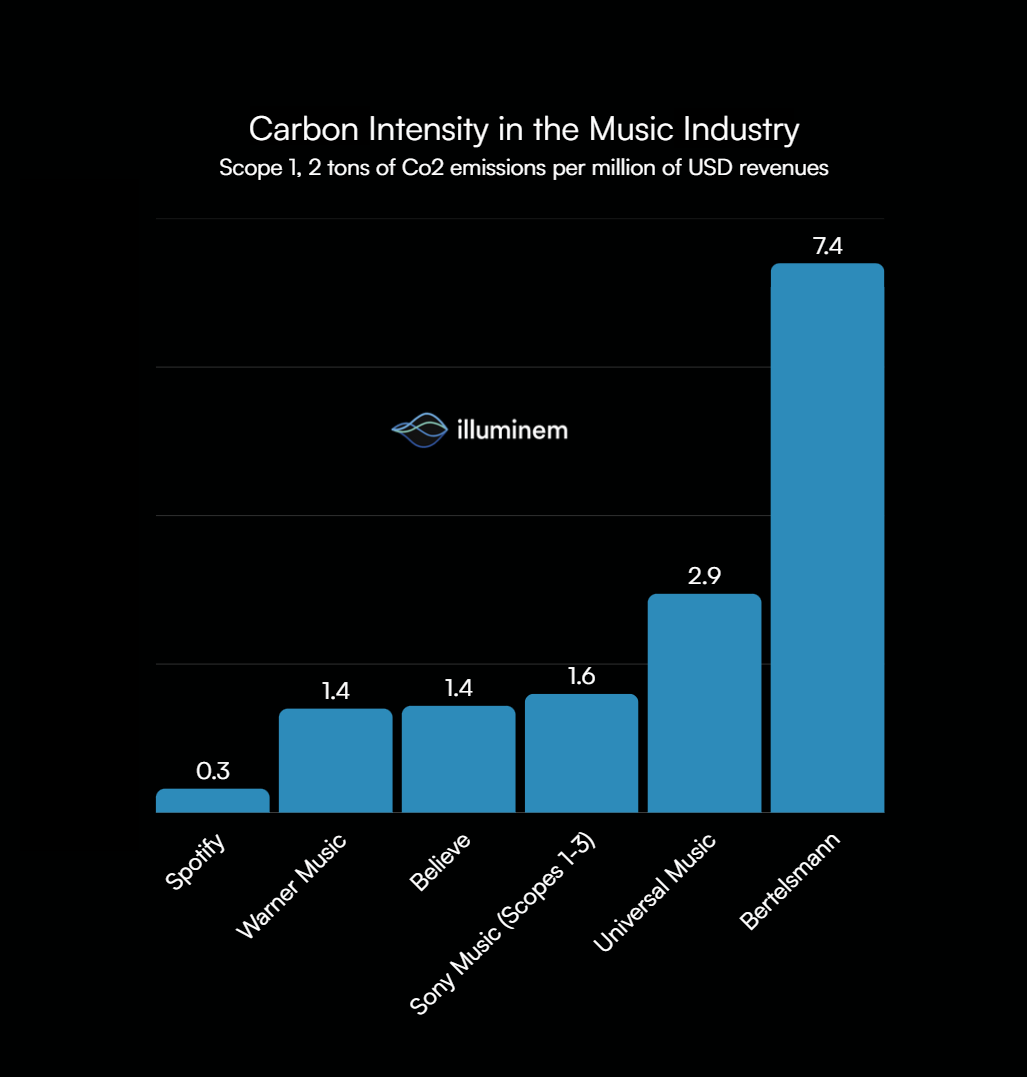Decarbonizing the Music Industry: Music to your Ears!
 Unsplash
Unsplash Unsplash
Unsplash· 6 min read
Purva Jain

Energy Transition · Energy Management & Efficiency
illuminem briefings

Sustainable Lifestyle · Social Responsibility
illuminem briefings

Pollution · Wellbeing
The Washington Post

Pollution · Wellbeing
The Washington Post

Fashion · Climate Change
The Telegraph

Sport · Climate Change
🎵 Register for the MUSIC X CLIMATE event on February 28 at 14:30 GMT / 15:30 CET in London and Online!
📊 Unlock a world of sustainable data with Sustainability Data Hub™ and contact us for a free package!
Sustainability is no longer just a concern for heavy industries and energy companies. It is a defining issue for every sector, including the music industry.
While this peculiar industry may not be the major emitter on the scale of energy or transportation, its significance also lies in its unparalleled cultural and social impact. Music has the power to bring people together, shape identities, and influence global audiences with new standards and examples. With its vast reach through live events, streaming, and merchandise, Music has a unique opportunity to promote sustainability and inspire change on a worldwide scale.
Nethertheless, the carbon footprint derived by live events, streaming, merchandise production, and touring emissions can’t be overlooked either. Understanding and mitigating its climate impact requires transparent and comparable Sustainability data.
Globally, live concerts and festivals generate up to 5 million tonnes of CO₂ per year, primarily from audience travel, energy use, and waste. This figure is comparable in magnitude to the overall Scope 1 & 2 emissions produced by a “polluting” airline like EasyJet (see its sustainability performance), or the annual emission of more than 160,000 cars. In the UK alone, where the event described in this article takes place, the figure is around 500,000 tonnes of CO₂. Music streaming, often perceived as a "green" alternative to physical media, actually contributes 350,000 tonnes of CO₂ annually due to the energy-intensive nature of data centers—a number set to continue increasing.
Using data from Sustainability Data Hub™, the first open sustainability platform offering visibility on the sustainability performance of all companies, we can indeed compare the carbon emissions of the major players in this sector and other 5,000+ companies. The following analysis examines the largest music companies by revenue, focusing on their carbon intensity (ordered by revenue):
• Spotify
• Believe


The analysis based on Data Hub™ data reveals significant differences in carbon intensity among major players in the music industry. These contrasts grow even more striking when factoring in Scope 3 emissions (largely affected by Live Music Events & Tours, Merchandise, Music Distribution & Retail), which make up the overwhelming majority of the industry's footprint, multiplying carbon intensity many times over. This highlights the crucial need to examine the entire value chain, particularly in a sector as “dematerialized” as music.
Among the so-called “Big Three”—Universal Music Group, Sony Music Entertainment, and Warner Music Group—the difference in carbon intensity is substantial, going from Warner Music 1,4 MTCO₂/USD to Universal Music 185,7 MTCO₂/USD. This can be partially explained by the fact that CO2 emissions methodologies for Scope 3 emissions are relatively unstandardized even among the industry’s major players. Notably, among the three, Sony is the only company that does not report detailed figures for its Scope 1 and 2 emissions specifically for its Music division, while Warner Music does not publicly disclose its Scope 3 emissions.
While operating in the same sector, top music companies also differ significantly in their geographical presence and business models, which in turn impacts their carbon emissions. Spotify, for example, generates relatively almost all of its revenues through streaming services which require minimal physical infrastructure, allowing it to maintain a lower carbon intensity compared to other players.
Despite criticism, music industry leaders have begun working on sustainability initiatives. Already in 2023, the three majors collectively joined the Music Industry Climate Collective (MICC), pledging to accelerate decarbonization and establish sector-wide guidelines. Further, with new event formats like We Love Green, a flagship festival organised by rigorous environmental standards, the future of the music industry is starting to “sound” more optimistic.
Recognizing the urgent need for decarbonization, illuminem is proud to support and present at Spin Ventures’ MUSIC X CLIMATE initiative, the launch of a dedicated working group to transform the music industry's environmental impact on the 28 February 2025 at 14:30 GMT / 15:30 CET in London and Online!
It will bring together record labels, tour operators, sustainability and circular economy innovators, and investors to chart a course towards carbon-negative music value chains.
This event, moderated by Nic Gorini, Managing Partner of Spin Ventures, will feature:
• Marci Zaroff: A pioneer in sustainable fashion and circular merchandise, and an Advisory Board member of the Music Industry Climate Collective
• Indrani Pal-Chaudhuri: An award-winning filmmaker and advocate for green energy and music
• Roni Gamzon: Co-founder of BioFluff and Savian, and an innovator in regenerative, bio-based materials for the consumer and retail sectors
• Clare Lichfield: Founder of Sequinova, a leader in petroleum-free, cellulose-based alternative materials for fashion and events
• Véronique Pevtschin: Co-CEO of TheGreenShot, driving climate innovation and decarbonisation in media and entertainment
• Andrea Gori: CEO of illuminem.com
With the backing of platforms like Waste or Wonder, an AI-powered initiative that provides real-time impact assessments and transformation strategies for the global music sector, MUSIC X CLIMATE aims to decarbonize live events, streaming, merchandise, and fan engagement.
With the Sustainability Data Hub™, everyone can access real-time sustainability data on thousands of public and private companies - including everyone’s favorite music platforms. This transparency is crucial for holding the industry accountable and driving meaningful change.
Data Hub allows:
✅ Comprehensive Benchmarking: to instantly compare the sustainability performance of companies across industries and geographies.
✅ Tailored Insights: to access customizable datasets around precise metrics on sustainable data, including proprietary purchasing intent and maturity in sustainability
✅ Actionable Transparency: to empower informed decision-making
To celebrate this launch and our mission to accelerate the sustainability transition, we’re offering a special gift to our readers. The first ten readers to contact us with the code "MUSICXCLIMATE" will receive a free annual subscription to the Sustainability Data Hub™. All others who reach out will be granted a free short-term access package, unlocking in-depth sustainability insights.
MUSIC X CLIMATE on 28 February presents a unique forum where the music industry’s leaders, artists, and innovators converge to explore sustainability in the arts. For ongoing insights and in-depth coverage on sustainability in the music industry and beyond, follow illuminem and join the broader conversation.